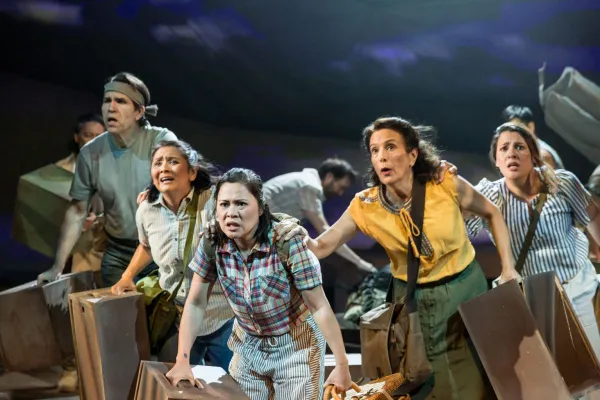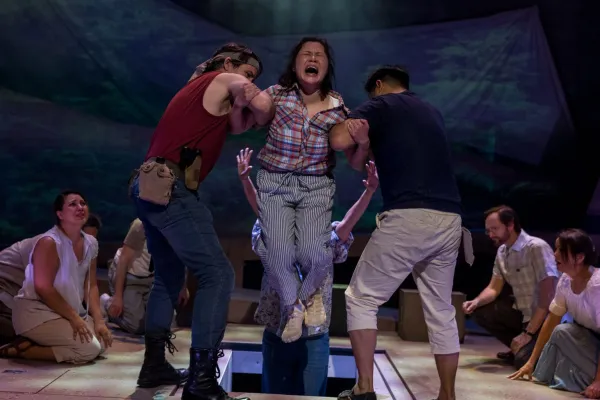Angelita Esperanza, Casey J. Adler, and Alexis Camins Photo by Grettel Cortes Photography
The subject matter of Boni B. Alvarez’s Mix-Mix, The Filipino Adventures of a German Jewish Boy is intriguing: How many people know that while the USA turned away boatloads of Jews fleeing the Nazis, the Philippines was one of the few places on Earth to welcome those seeking to escape persecution – and eventually eradication? This lost chapter of history is especially interesting to me because my own extended blended family includes both Jews (albeit of Ukrainian, not German ancestry) and Filipinos. So, I went to see Mix-Mix with high hopes, but alas, I have to give this two-act drama staged in the cavernous subterranean depths of Downtown’s Los Angeles Theatre Center a mixed review.
While Mix-Mix’s subject matter is captivating, its execution is not. Alvarez’s story is based on the real life Ralph J. Preiss, the play’s eponymous German Jewish Boy, who is here called Rudy Preissman (depicted by Casey J. Adler), and was one of only about 1,100 Jews who found sanctuary in the Philippines, thanks to the generosity and hospitality of Pres. Manuel Quezon and the Filipino people. (As the Philippines was then a U.S. colony, one may assume that Uncle Sam restricted the flow of more oppressed Jews to the southeast Asian territory.) But while those Jews evaded the Holocaust, on Dec. 7/8, 1941, the Imperial Japanese bombed and invaded the Philippines the same day as the Pearl Harbor sneak attack, and they were confronted again by fascism on their doorstep. (BTW, the Dec. 7/8, 1941 offensive was the most wide-ranging, successful surprise attack in military history – while Americans mostly know about the assault on Hawaii, Tokyo’s militarists also launched invasions in much of Asia that fateful day.)
Mix-Mix’s action goes back and forth in time, but is mostly centered on the Preissmans’ evacuation with a band of Filipinos from Manila to the side of the volcano Mt. Banahaw in 1944. Apparently, they run away from the capital after Gen. Douglas MacArthur’s much-ballyhooed “return” to the Philippines retriggering intense WWII battles, but like much else in Alvarez’s play, this isn’t really clear or fully answer the question: “What’s a nice Jewish boy like you doing in a place this?”
Alvarez’s historically-based production also doesn’t make it crystal clear why the Preissmans fled Germany, although there is a fleeting reference in a flashback to Kristallnacht, a night of Nazi terror aimed against Jews in November 1938. I believe it’s a mistake for dramatists to assume that audiences have knowledge about historic events – they need to dramatize this onstage and onscreen. For instance, filmgoers of a certain age and awareness may have a strong sense of the brutal extermination going on behind those walls at Auschwitz, but I think this should have been brought into sharp focus in the recent award-winning Zone of Interest movie.
While basic exposition is somehow skirted in this 2-hour-plus production (including an intermission), the playwright somehow finds lots of time for a silly subplot about Filipino movies (admittedly, there’s something clever in one aspect of this otherwise wasted sequence, with characters leaving reality and entering the onscreen action, although Buster Keaton did a movie version of this in 1924’s Sherlock Jr., as did Woody Allen in 1985’s The Purple Rose of Cairo).
Mix-Mix also only mentions in passing what – literally – great lengths those wandering Jews underwent to get from Germany to the Philippines, which is about 12,000 nautical miles from Berlin. Some may also object to the Western character being, yet again, the protagonist of a saga set in the Third World, but here I think that Alvarez does indeed flesh out the Native characters, who are more than mere backdrop for the exploits of “whitey” in an exotic, far away land. A good example is Mousie, played by Angelita Esperanza. Furthermore, by illustrating this forgotten piece of history Alvarez is actually shining a light on a heroic, noble chapter of Filipino history. Not many countries did provide havens for Jews – certainly not America, although England did for Jewish children through the “Kindertransport” program and also Shanghai (the famed Harvard legal scholar Laurence Tribe is able to critique Trump’s tyranny on MSNBC today because his family found sanctuary in that Chinese city).
This is likely because Alvarez is himself of Filipino ancestry and Boni was named after Andrés Bonifacio, an anti-colonial revolutionary. Strangely, Alvarez’s heritage goes unmentioned in Mix-Mix’s playbill – a forehead slapping, glaring omission; I had to do extensive, deep research (translation: I Googled the playwright) to confirm he was of Filipino lineage. (See: https://skylighttheatre.org/meet-the-artist-boni-b-alvarez/.) What a curious oversight of a very pertinent fact re: this particular production. Who writes LATC’s bios? Mr. Magoo?
In any case, the rule of thumb in our more enlightened age for storytelling about Westerners abroad is, instead of Lawrence of Arabia, think “Arabia with Lawrence,” and for the most part director Jon LAWRENCE Rivera and the overall culturally sensitive Mix-Mix accomplish this. There are some amusing tidbits about sharing American pop culture and affecting scenes, such as how the transplanted Jewish schoolboy tries to adapt to his mostly Catholic refuge. In a flashback we see Rudy’s Bar Mitzvah in Manila’s only synagogue (although Casey Adler is too old to be cast as a Bar Mitzvah boy, that’s a mere quibble as he’s good in the role). In another scene involving death, one of the Preissmans invokes the Jewish mourners’ Kaddish, “Yisgadal, yisgadal.” The cross-cultural camaraderie is touching – perhaps Filipinos opened their arms to Europe’s persecuted Jews because they knew a thing or two about oppression, due to their experiences with Spanish colonialism and Yankee imperialism, as well as Japanese militarism. (Check out what Mark Twain has to say about US mass murder perfidy in the Philippines.)
One thing I learned from the play is that the delicious dessert, Halo-Halo, actually means “Mix-Mix,” and this is a clever metaphor and way to introduce the notion of tolerance. As Rodney King poignantly put it: “People, can we get along?”
The stage has different levels and trapdoors but is most barely. There are portions of trees on stage right and left, but the tropical ambiance is mostly imbued via projections wrought by Nicholas Santiago. Some of the mise-en-scene is stylized and the POV is related at times via Reggie Lee’s choreography. Perhaps because I sat in the front row seat the play was often too loud and noisy for my tender eardrums.
A final point is that while Mix-Mix is being released during Asian American and Pacific Islander month, its tale of Jewish persecution is interestingly timed, considering the Israel-Palestine conflagration now engulfing the region – and our college campuses. Some may find Mix-Mix to be an affirmation of Jewish suffering, while others may ask: But what about Palestinian misery? Depending on one’s point of view, it’s a mixed plate.
The Latino Theater Company and Playwrights’ Arena production of Mix-Mix, The Filipino Adventures of a German Jewish Boy runs through June 16 on Thursdays, Fridays and Saturdays at 8:00 p.m. and Sundays at 4:00 p.m. at the Los Angeles Theatre Center, 514 S. Spring Street, Los Angeles, CA 90013. For info and tickets: (213)489-0994; https://www.latinotheaterco.org/mixmix.






